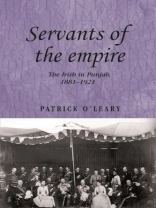Punjab, ‘the pride of British India’, attracted the cream of the Indian Civil Service, many of the most influential of whom were Irish. Some of these men, along with Irish viceroys, were inspired by their Irish backgrounds to ensure security of tenure for the Punjabi peasant, besides developing vast irrigation schemes which resulted in the province becoming India’s most affluent. But similar inspiration contributed to the severity of measures taken against Indian nationalist dissent, culminating in the Amritsar massacre which so catastrophically transformed politics on the sub-continent.
Setting the experiences of Irish public servants in Punjab in the context of the Irish diaspora and of linked agrarian problems in Ireland and India, this book descrides the beneficial effects the Irish had on the prosperity of India’s most volatile province. Alongside the baleful contribution of some towards a growing Indian antipathy towards British rule. Links are established between policies pursued by Irishmen of the Victorian era and current happenings on the Pakistan-Afghan border and in Punjab.
Table of Content
Part I: Context
1. Introduction: The scattered Irish
2. India and Punjab in the late nineteenth century
3. The Indian Public Service
4. Who were they?
5. Straits settlements, Malaya and Ceylon
Part II: The frontier
6. Waziristan: warriors and administrators
7. Pro-consul and the Viceroy
8. Frontiersman and the diplomat
Part III: Land and infrastructure
9. Land: The Irish dimension
10. Canal colonies
11. Dane and land bills
12. Irish engineers and Punjab’s infrastructure
Part IV: Politics and society
13. Lansdowne and Fitzpatrick
14. Punjab affairs are Simla affairs
15. Dane and O’Dwyer
Part V: Conclusions
16. Conclusions
Appendices
Bibliography
Index
About the author
John Mac Kenzie is Emeritus Professor of Imperial History, Lancaster University and holds Honorary Professorships at Aberdeen, St Andrews and Stirling, as well as an Honorary Fellowship at Edinburgh.












